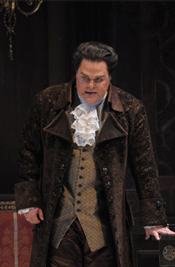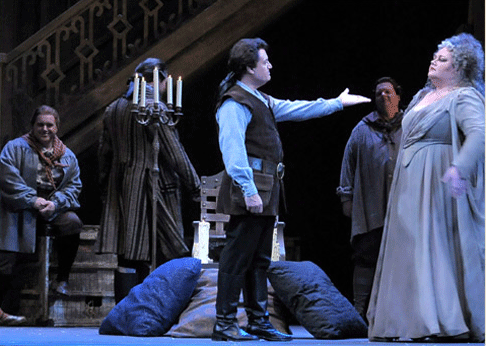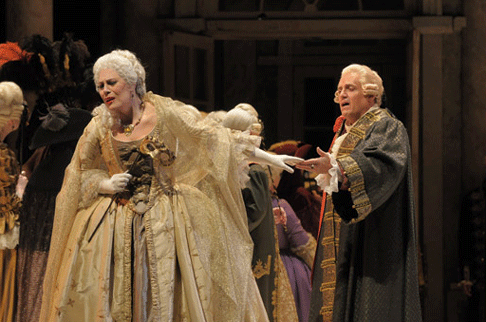Stage director Renata Scotto has achieved a believably
dignified and fluid progression of scenes leading up to the tragedy of
misunderstandings. The role of King Gustavus III of Sweden is taken by Frank
Lopardo, while that of Amelia his beloved features soprano Sondra Radvanovsky.
Baritone Mark Delavan sings Count Anckarstrˆm, husband of Amelia as well as
close friend of the King. The travesti role of the page Oscar is sung
by Kathleen Kim and Mme. Arvidson signaled the debut at Lyric Opera of
Stephanie Blythe. Through a sensitive approach to tempos Asher Fisch conducted
a meaningful account of one of Verdi’s most lyrical scores.
 Mark Delavan as Renato
Mark Delavan as Renato
The principals in the first scene of Act I establish themselves immediately
in the movements and dramatic interchange of this production. The
ballo of the final scene is, of course, foreshadowed now by means of a
list of invited guests for the event of the present evening. As the curtain
opens on the reception room of an eighteenth-century court, both supporters and
detractors of Gustavus give vent to their feelings. The page Oscar, so often in
this work a dramatic hinge, announces the King’s arrival with the famous
line, “S’avanza il Re.” [“The King approaches”]
In the role of Oscar Ms. Kim moves nimbly and projects her lines with a
delighted urgency. The event of this evening’s ballo is now used
as a means to stir the King’s emotions in the first of that
character’s arias. When Gustavus sees in the list his beloved
Amelia’s name, he sings rapturously of expecting her presence that night.
Mr. Lopardo’s introductory declamation and performance of “La
rivedr‡ nell’estasi” [“what ecstasy to see her again”]
are exemplary: in both parts of the scene he demonstrates an assured skill in
legato with effective touches of vocal color on significant phrases, such as
“E qui sonar d’amore.” [“and music of love.”]
When the petitioners are instructed to leave, Oscar shows in Count Anckarstrˆm
who now advises the King on matters of the court. As he warns Gustavus of a
plot against his life, Anckarstrˆm’s lines rise upward with dramatic
force. A similar vocal technique is needed in the baritone Anckarstrˆm’s
first solo piece, “Alla vita che t’arride,” [“To your
life so promising”], which occurs before Oscar reenters. It is in such
transitional moments that Mr. Delavan’s interpretation falls short. His
reach to an upper register becomes noticeably detached from the preceding lines
so that dramatic effects do not match his intended goal. The conclusion of this
scene, devoted to varying opinions of the fortuneteller Mme. Arvidson,
highlights both individual and ensemble work. Once the judge declares that Mme.
Arvidson should be banished because of witchcraft, Oscar issues a spirited
defense of the woman in that character’s first solo aria, “Volta la
terrea” [“the sallow one turned”]. Ms. Kim tosses off this
piece with secure vocal agility, while she acts out the noted appeal of the
sorceress with movement and dramatic gesture. Gustavus resolves to visit her
hovel despite the protestations of individual courtiers, the plan for this
adventure being affirmed in a rousing conclusion.
 Frank Lopardo as Gustavo and Stephanie Blythe as Ulrica
Frank Lopardo as Gustavo and Stephanie Blythe as Ulrica
The second scene of the act introduces both the characters Mme. Arvidson and
Amelia. In her interpretation of the fortuneteller Ms. Blythe uses all facets
of her rich vocal range. Her hushed, piano intonations in the first
part of her incantation to Lucifer are followed by excitingly ringing top
notes, while she signals her enhanced communication with the forces beyond. As
she concludes with a thrilling and extended chest note on
“Silenzio!”, Ms. Blythe’s disheveled persona looks truly
possessed. She prophesies riches and rank for the sailor Cristiano, who is
convincingly sung and acted in this production by Paul La Rosa. After he is
sent off — the entire scene being observed from a distance by the
disguised King Gustavus — Amelia enters and solicits the intercession for
her part of Mme. Arvidson. She begs for a solution to her emotional attraction
to Gustavus, which has distracted her from duty. Mme. Arvidson tells her to
pick at night a magic herb growing at an isolated gallows outside the city.
Even in this relatively brief exchange Ms. Radvanovsky communicates in her
liquid vocal lines a sense of urgency, hinting at her extended prayer in the
subsequent act. The trio which now follows indeed features her first prayer to
God, while Mme. Arvidson encourages her daring to find the herb and Gustavus,
still unseen, simultaneously promises to follow. [“Consentimi, o
Signore” (“Grant to me, o Lord”)]. Here Ms.
Radvanovsky’s voice soars in her appeals for help, such that she
effectively binds the trio into a crescendo of determination. In the final part
of the scene following Amelia’s departure Gustavus emerges and demands
that the fortuneteller predict his future. When Mme. Arvidson sees the sign of
death in his palm, the reaction “Presto morrai” [“Soon you
will die”] is delivered by Ms. Blythe with chilling certainty in her
intonation. Gustavus laughs off the divination and clasps the hand of
Anckarstrˆm, hence sealing the prediction that he will die by the hand of the
next person whom he thus greets.
In the constellation of beloved and spouse which makes up the shorter second
act of Un ballo the emotions and conflicts introduced earlier develop
into a turning point for the principals. After appropriately fast and bright
tempi under Fisch’s direction, Amelia enters at the isolated gallows
while snow falls. As she reaches for the herb, she recoils in fear, which
Radvanovsky emphasizes with a distinct intonation on “terrore.” In
her following aria, “Ma dall’irido stelo” [“But when
from the dry stem”], she sings with great pathos, her tone moving from
lament to self-encouragement and ending in the touching prayer for divine
support. Throughout the aria, and notably in the final ascent and following
“Miserere,” Radvanovsky exhibits the ideal Verdian soprano range,
assured middle and upper registers bound seamlessly with admirable breath
control. When Gustavus enters and declares “Teco io sto” [“I
am here with you”], the subsequent duet allows both to admit their love.
At first Amelia protests that the King should leave her, a line that
Radvanovsky sings with telling diminuendo on “Mi
lasciate.” During the well-known scene Lopardo’s voice blooms in
lyrical abandon as Gustavus is transported by the assurance of Amelia’s
love. Lopardo’s tasteful performance of top notes in the duet is matched
by Radvanovsky’s line as the two singers blend vocally toward each other.
Soon after the declaration of love a warning alerts the King of Cout
Anckarstrˆm’s approach. Gustavus entrusts the veiled Amelia to
Anckarstrˆm and asks his friend to accompany the unnamed woman back to the
court. Although Anckarstrˆm had come to warn the King of a plot against his
life, loyalties soon shift: Amelia’s veil drops when she tries to protect
her husband and the latter perceives his wife’s emotional betrayal. In
the final ensemble, at which the Count is mocked by the courtiers returning to
court, Amelia’s final notes, as here performed, give expression to her
sense of an undeniable love with a tragic outcome.
 Sondra Radvanovsky as Amelia and Frank Lopardo as Gustavo
Sondra Radvanovsky as Amelia and Frank Lopardo as Gustavo
In Act III the Count gives vent to his anger as the two arias of the first
scene reflect on the couple’s marriage. When the Count threatens to have
Amelia killed, she begs for the opportunity to see her child one last time.
Radvanovsky’s approach to the aria, “MorrÚ, ma prima in
grazia,” [“I shall die, but first in mercy”], evinces a
number of vocal touches that blend ideally with the orchestra to express her
character’s suffering. Once she leaves, the Count sings of his own
anguish and the betrayal he feels at the King’s behavior. In
Delavan’s approach to “Eri tu” [“It was you”] an
admirable sense of legato is marred by an attack stronger than
necessary at the beginning of lines. The conspirators now enter and the Count
throws in his lot with them against the King. When Amelia returns, she is
forced to choose the name of the one privileged to slay the King. As the scene
ends with the Count’s name selected and the venue of the ball announced,
the vocal ensemble rises in excitement to the fateful evening.
In the final scene before the ball, when the Count indeed shoots the King
fatally, Gustavus performs his last aria alone, while musing on his devotion
for Amelia yet his resolve to send the couple away from court. As his voice
moves here through successive phrases with an exquisite sense of line, Lopardo
echoes the love expressed in his earlier scenes but now with an appropriate
foreboding on “del nostro amor” [“of our love”]. His
inevitable death at the hands of the Count is accompanied by a moving
declaration of Amelia’s innocence, her own voice then rising expressively
in horror at the turn of events.
Salvatore Calomino
image=http://www.operatoday.com/Ballo_Chicago04.gif
image_description=Sondra Radvanovsky as Amelia and Frank Lopardo as Gustavo [Photo by Dan Rest courtesy of Lyric Opera of Chicago]
product=yes
product_title=Giuseppe Verdi: Un ballo in maschera
product_by=Gustavo: Frank Lopardo; Amelia: Sondra Radvanovsky; Ulrica: Stephanie Blythe; Oscar: Kathleen Kim; Samuel: Craig Irvin; Tom: Sam Handley Silvano: Paul La Rosa. Conductor: Asher Fisch. Director: Renata Scotto. Lighting Designer: Christine Binder. Chorus Master: Donald Nally.
product_id=Above: Sondra Radvanovsky as Amelia and Frank Lopardo as Gustavo
All photos by Dan Rest courtesy of Lyric Opera of Chicago